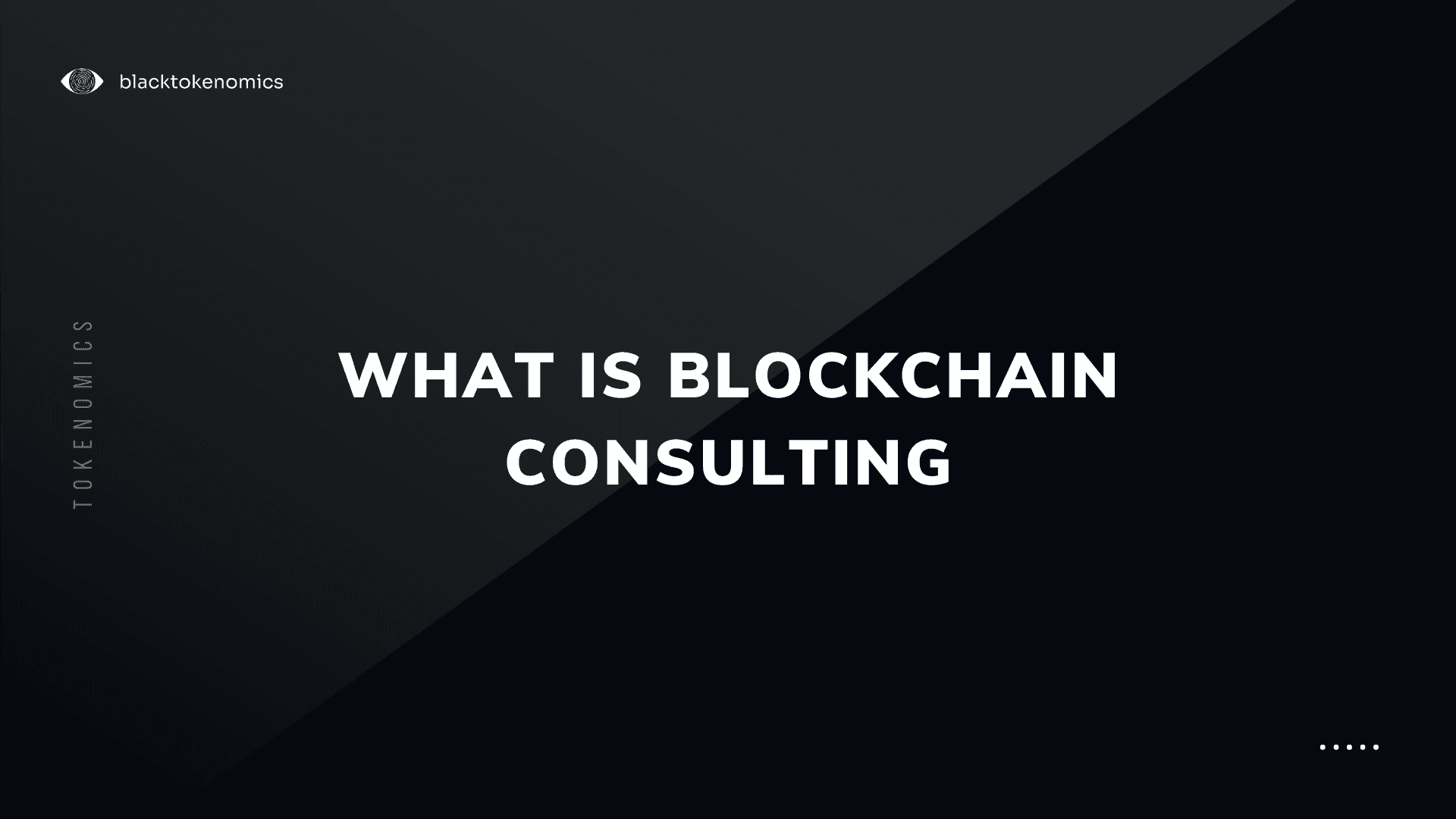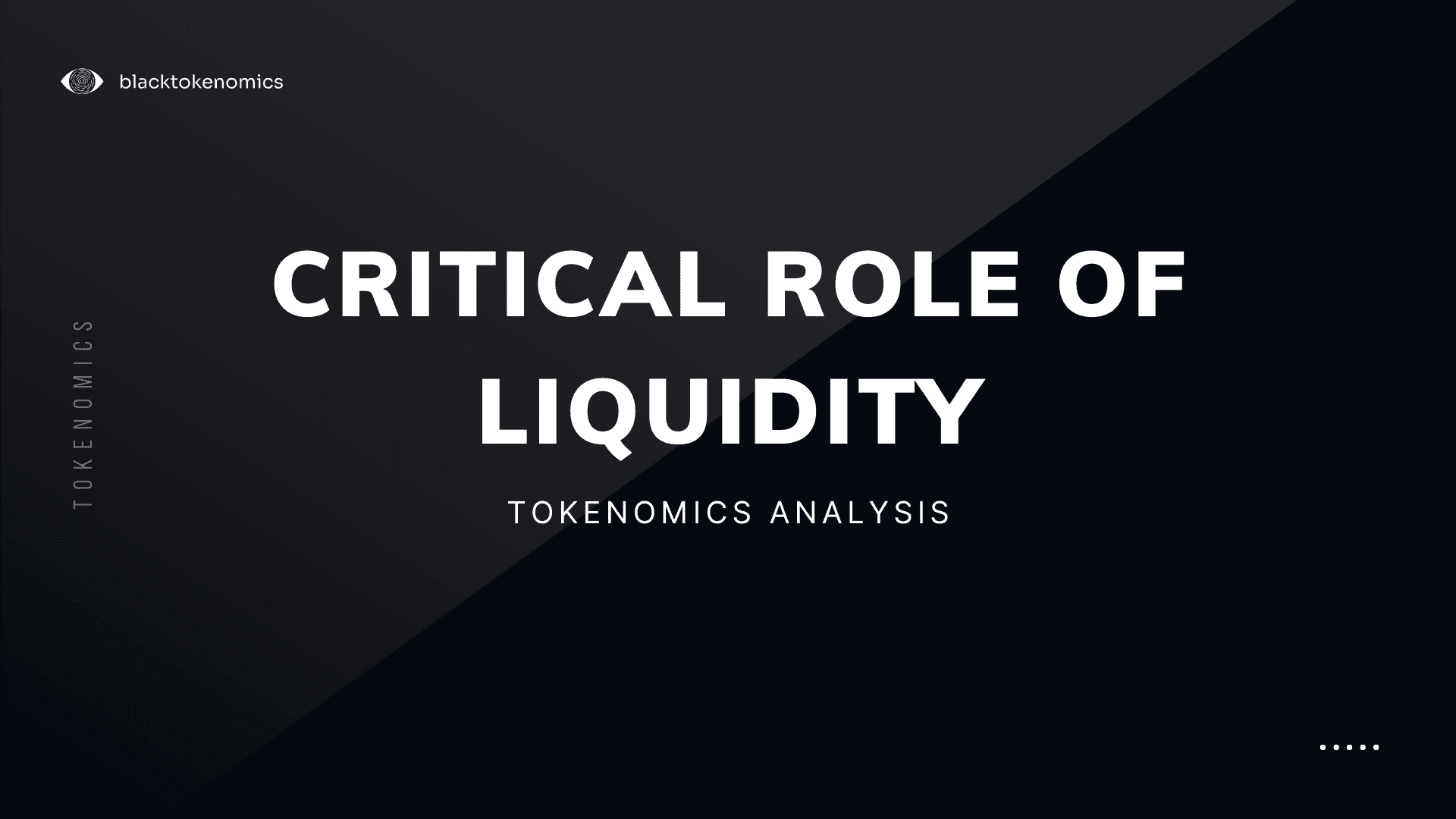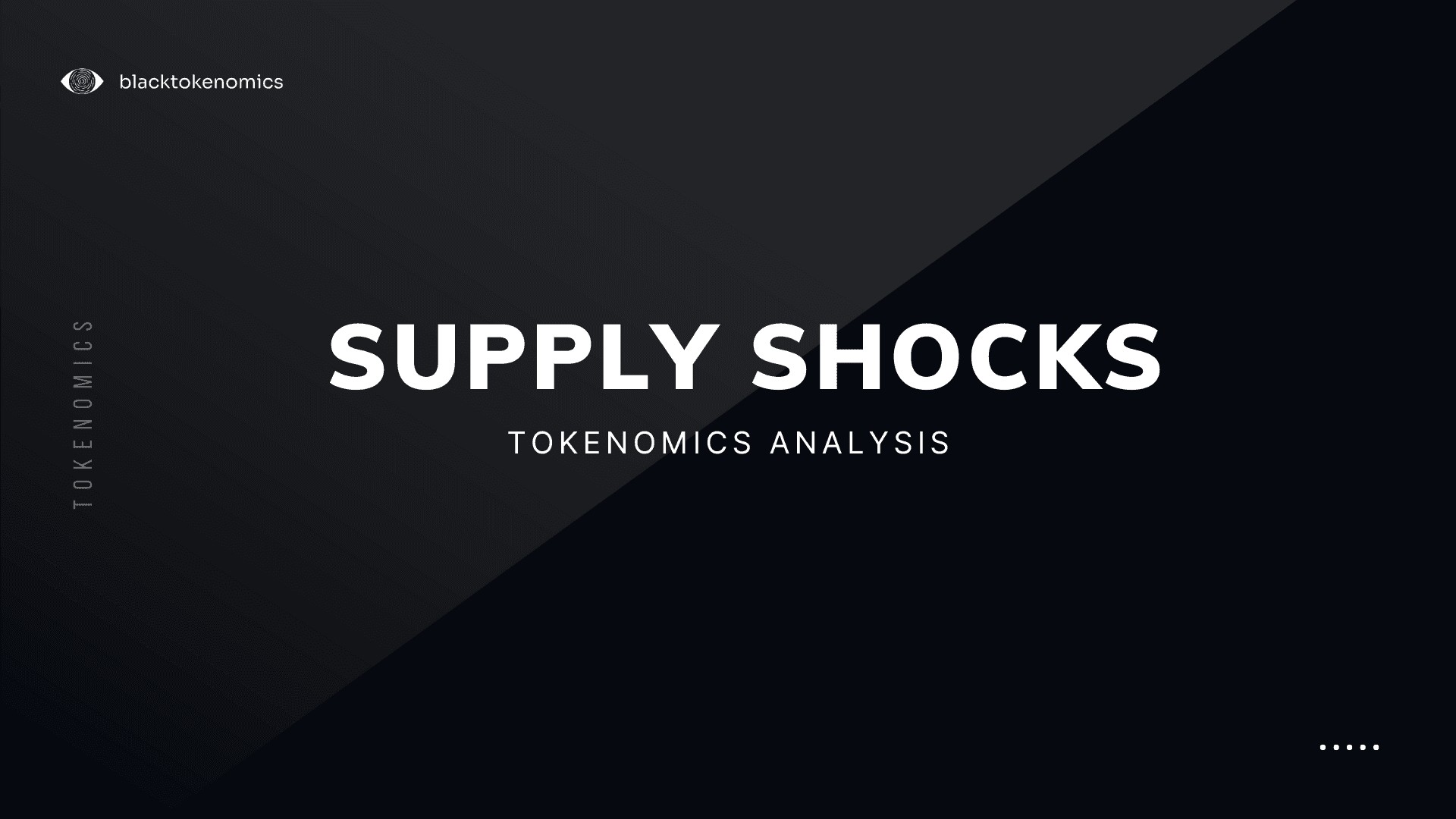
Lisa Dubois
What is blockchain consulting? It is strategic advisory and implementation support that helps businesses adopt blockchain technology.
This brief guide covers the core services consultants offer, from strategy and integration to custom development, and the transformative impact these services can have on your business without overwhelming you with technical details.
Blacktokenomics specializes in tokenomics consulting.
Key Takeaways:
Blockchain consulting services bridge the gap between complex blockchain technology and practical business applications, offering strategic guidance, custom solutions, and implementation assistance to facilitate business transformation.
For successful blockchain strategy formulation and integration, businesses must identify objectives, evaluate project viability, develop a comprehensive strategy that includes a compatibility assessment for integration with existing systems, and ensure a seamless transition to the new technology.
Blockchain consulting is highly industry-specific, delivering customized solutions that cater to the unique challenges of sectors such as FinTech, healthcare, and real estate, while streamlining operations, enhancing transparency, and improving security through tailored development processes.
Demystifying Blockchain Consulting

Blockchain consulting acts as a conduit, linking businesses to the capabilities of blockchain technology. Blockchain consulting services provide an array of services that empower businesses to comprehend and exploit this technology in practical applications. A skilled blockchain developer plays a crucial role in implementing these solutions, often working alongside blockchain experts.
Through strategic guidance and implementation assistance, the intricate aspects of blockchain technology are made simpler, facilitating business transformation.
The Role of a Blockchain Consultant
A blockchain consultant acts as a mentor, steering businesses through the adoption of blockchain technology. They offer guidance on blockchain adoption initiatives and translate business objectives into technology roadmaps. Blockchain consultants offer a wide range of professional advice, from understanding blockchain technology to conducting feasibility studies and managing a minimum viable product (MVP).
They collaborate with businesses to devise customized solutions that cater to their specific needs and objectives.
Core Services in Blockchain Consultancy
Blockchain consultancy’s comprehensive blockchain consulting services include:
Strategy development
Blockchain integration
Custom development
Training
These services, provided by blockchain development companies, offer businesses a roadmap to navigate the complex landscape of blockchain technology and realize its full potential, thanks to the expertise of blockchain developers and the use of blockchain development platforms.
Strategic Benefits for Businesses
Implementing blockchain technology in business operations yields a myriad of strategic benefits. Blockchain enhances security by incorporating encryption and reducing the risks associated with single points of failure. It also increases transparency through its immutable ledger system, providing a tamper-proof record of all transactions.
Furthermore, blockchain technology offers several benefits, including:
Optimizing business processes
Reducing intermediary involvement
Automating laborious tasks
Improving efficiency
Creating opportunities for automation
Reducing operational costs
These advantages make blockchain an attractive option for businesses looking to streamline their operations and save money.
Crafting Your Blockchain Strategy

A meticulously formulated blockchain strategy can pave the way for successful adoption and usage of blockchain technology. The development of this strategy begins with identifying business objectives to ensure alignment with the specific problem that the blockchain solution aims to solve. Market research plays a crucial role in assessing the feasibility of the blockchain project by providing valuable insights into the industry’s environment.
The next step is to plan the journey of blockchain implementation, which involves:
Establishing clear objectives
Evaluating existing processes
Exploring suitable blockchain solutions
Creating a strategic timeline with key milestones.
Identifying Business Objectives
The first step in formulating a blockchain strategy is to clearly define the business objectives. Blockchain solutions can be integrated with company goals by:
Enhancing transaction processing efficiency
Minimizing manual tasks
Increasing transparency
Simplifying reporting
The strategic benefits of blockchain technology can only be realized when there is a clear understanding of the company’s objectives and how blockchain can be leveraged to achieve them.
Evaluating Project Viability
Assessing the project’s viability is a key element in the blockchain strategy. It involves:
Assessing the technical and financial feasibility of the proposed blockchain solution
Techniques such as comprehensive assessments, use case analysis, and scrutinizing detailed data within the blockchain are employed to evaluate financial viability
Blockchain technology can influence cost estimates in a project, leading to substantial cost savings.
The feasibility of a blockchain project is also significantly influenced by market demand, particularly in industries with a focus on supply chain management.
Roadmapping the Blockchain Journey
The subsequent step in formulating a blockchain strategy is charting the course of the blockchain journey. To do this, follow these steps:
Establish clear objectives
Evaluate existing processes
Explore suitable blockchain solutions
Create a strategic timeline with key milestones
Execute and consistently oversee the progress
By following these steps, you can effectively plan and implement your blockchain strategy.
This roadmap serves as a guide for the implementation of the blockchain strategy, ensuring that all steps are geared towards achieving the company’s goals.
Integrating Blockchain into Existing Systems

Incorporating blockchain into existing systems necessitates meticulous planning and execution, given its complexity. This process involves a compatibility assessment to ensure that blockchain technology can be effectively integrated with existing systems.
Following this, custom blockchain development services are used to create a solution that closely aligns with the specific requirements of the business. Finally, steps are taken to ensure a seamless transition to blockchain integration, minimizing disruption and maximizing the benefits of blockchain adoption.
Compatibility Assessment
Executing a compatibility assessment is the initial move towards integrating blockchain into existing systems. It involves testing and evaluating the compatibility of a blockchain application with other systems or platforms, and assessing its performance in terms of transaction speeds and scalability.
Information gathered from the compatibility assessment is crucial in identifying potential challenges and opportunities for integrating blockchain technology into existing systems.
Custom Blockchain Development Services
After carrying out a compatibility assessment, custom blockchain development services are employed to create a tailored solution that meets the specific needs of the business. These services address challenges such as:
Data storage
Security enhancement
Cost reduction
Speed improvement
Other related aspects
The duration for custom blockchain development can vary based on the application’s requirements, but on average, it typically takes 1-2 months.
Ensuring Seamless Transition
Guaranteeing a smooth transition constitutes the final step in incorporating blockchain into existing systems. This is achieved by adhering to best practices such as:
Conducting feasibility assessments
Selecting a suitable blockchain platform
Creating a proof of concept
Involving stakeholders
Ensuring data security
Providing personnel training
Monitoring and evaluating the integration process continuously.
The transition is also facilitated through the use of APIs and data-sharing standards, allowing for the blending of centralized legacy systems with decentralized blockchain networks.
Navigating the Blockchain Ecosystem
The blockchain ecosystem, a intricate network of technologies, stakeholders, and processes, collaboratively propels the adoption and application of blockchain technology. Navigating this ecosystem requires a deep understanding of its key components, including the different types of blockchain protocols, the role of smart contracts, and the concept of distributed ledger technology.
By understanding these components, businesses can effectively navigate the blockchain ecosystem and leverage its power to their advantage.
Selecting the Right Blockchain Protocol
Choosing an apt blockchain protocol is an essential step in maneuvering through the blockchain ecosystem. The chosen protocol should provide optimal security, scalability, and functionality for the specific use case. There are various categories of blockchain protocols, each with distinct features and applications.
For instance, Ethereum is utilized for decentralized applications and programmable contracts, while Bitcoin is employed for secure and decentralized digital currency transactions.
Leveraging Smart Contracts
Smart contracts are a key component of the blockchain ecosystem. They are software programs that execute when specific conditions are fulfilled, automating the enforcement of contract terms between involved parties.
By leveraging smart contracts, businesses can automate processes and transactions, increasing efficiency and reducing costs.
Understanding Distributed Ledger Technology
Distributed ledger technology (DLT) is another fundamental component of the blockchain ecosystem. It facilitates the recording, sharing, and synchronization of transactions in a decentralized and secure manner.
Understanding DLT provides a foundation for building and implementing blockchain solutions, and it offers several advantages, including improved transparency and heightened security.
Understanding Distributed Ledger Technology

In a multitude of ways, blockchain solutions can considerably boost business efficiency. By streamlining supply chain management, businesses can enhance the transparency and traceability of products from their origin to the consumer. Additionally, automation with blockchain can contribute to cost reduction by eliminating intermediaries and streamlining processes.
Furthermore, blockchain technology can improve data security and trust by ensuring data integrity and trustworthiness.
Streamlining Supply Chain Management
Within the supply chain, blockchain technology can greatly enhance transparency and traceability. By enabling participants to view and verify transactions in real-time, blockchain improves the speed and efficiency of product delivery and reduces errors and fraud.
It also allows for more effective tracking of goods and improved inventory management, leading to more efficient operations.
Reducing Costs Through Automation
Automation is another key benefit of blockchain technology that can lead to significant cost reduction. Smart contracts automate the execution of contracts and transactions, removing unnecessary transaction costs and decreasing the need for manual oversight.
By eliminating intermediaries, blockchain can also reduce transaction fees and costs associated with managing, storing, and verifying data.
Enhancing Data Security and Trust
Blockchain technology also plays a crucial role in enhancing data security and trust. By incorporating encryption and reducing the risks associated with single points of failure, blockchain significantly enhances security.
Through its immutable ledger system, blockchain also provides a tamper-proof record of all transactions, further enhancing transparency and trust.
Tailored Blockchain Consulting for Various Industries
Blockchain consulting is a customizable service, not a one-size-fits-all solution. It can be modified to cater to the distinctive needs of different industries. It is also closely related to web 3 consulting.
In the FinTech industry, blockchain technology is revolutionizing financial transactions by enabling secure, transparent, and efficient processes.
In the healthcare sector, blockchain provides enhanced security, privacy, and interoperability for healthcare data management. And in the real estate sector, blockchain is driving innovations such as streamlined processes, reduced intermediaries, and tokenization of assets.
Financial Transactions in FinTech
In the FinTech industry, blockchain technology is transforming financial transactions. It uses a decentralized and transparent digital ledger to securely record and manage transactions. In addition to enabling faster and more cost-effective services, blockchain technology also provides access to unchangeable records of financial transactions, which can be used to evaluate creditworthiness.
Healthcare Data Management
In the healthcare sector, blockchain technology is enhancing data management by ensuring the immutability of patient records, facilitating secure transfer of medical records, and managing the drug supply chain.
By enabling enhanced data access, improved data aggregation, and ensuring data integrity and security, blockchain technology improves interoperability in healthcare systems.
Innovations in Real Estate
In the real estate sector, blockchain technology is driving significant innovation. It facilitates:
New methods for buyers and sellers to connect
Enhanced accuracy of property valuations
Applications such as asset management, real estate funds, and project financing.
Furthermore, the tokenization of real estate assets allows for the fractional ownership of properties, offering investors greater liquidity.
The Blockchain Development Process Unveiled

The blockchain development process is multi-faceted, encompassing stages that range from initial discovery and analysis to designing and prototyping, and finally implementing and testing solutions. Each of these stages plays a vital role in the successful execution of a blockchain project, and a deep understanding of each is crucial for businesses seeking to integrate blockchain technology into their operations.
Initial Discovery and Analysis
The stage of initial discovery and analysis entails comprehending the client’s requirements, objectives, and current systems. Blockchain consultants utilize blockchain analysis solutions for transaction monitoring and risk assessment during this stage.
The information obtained from this stage is then used to guide the blockchain project, ensuring that design and development are aligned cohesively through well-informed decision-making processes.
Designing and Prototyping
The subsequent stage of designing and prototyping encompasses formulating a visual depiction of the proposed solution and evaluating its functionality. During this stage, factors such as scalability, security, privacy, the consensus mechanism, and the selection of the blockchain platform and node architecture are considered.
The role of a prototype in blockchain development is to assess the viability of a concept, examine features and performance, and collect user feedback to refine the solution.
Implementing and Testing Solutions
Implementing and testing solutions constitute the final stage in the development process. This involves:
Establishing a test plan and environment
Preparing test data
Formulating a test strategy
Developing test cases
Conducting a range of tests.
The implementation process involves:
Preventing wastage of resources on unsuitable solutions
Offering guidance and strategic insights
Evaluating business requirements
Ensuring smooth integration with current systems and infrastructure.
Choosing the Right Blockchain Consulting Company
Selecting an appropriate blockchain consulting company is a critical choice that can profoundly influence the success of a blockchain project. When selecting a blockchain consulting company, it is important to evaluate the company’s expertise and experience, as well as consider the engagement model.
Evaluating Expertise and Experience
One can gauge the expertise and experience of a blockchain consulting company by examining their technical proficiency, their familiarity with a variety of blockchain projects, and their track record of successful endeavors. It’s also important to assess the company’s experience and track record through past projects and client references.
Considering the Engagement Model
Another key factor to consider while selecting a blockchain consulting company is the engagement model. This model outlines the project expectations, responsibilities, obligations, and commitments between the consulting company and the client, delineating the framework for project execution.
The selection process is impacted by the engagement model as it establishes the consulting company’s approach and level of involvement.
Summary
In conclusion, blockchain consulting is a vital service for businesses looking to harness the power of blockchain technology. From demystifying the complex technology to crafting a tailored blockchain strategy, integrating blockchain into existing systems, and selecting the right blockchain consulting company, blockchain consulting provides businesses with the roadmap and expertise they need to successfully navigate the blockchain ecosystem.
As the world continues to evolve towards greater digitalization, the role of blockchain consulting in unlocking the potential of blockchain technology is set to increase.
Frequently Asked Questions
What is the salary of Blockchain Consultants?
A blockchain consultant can earn an average salary of around $125,000 to $175,000 per year, depending on the specific location and experience level. The median annual salary is estimated to be about $107,000.
How much does blockchain consulting cost per hour
Blockchain consulting can cost between $81 to $200 per hour on average, with potential for an increase due to rising demand for blockchain developers.
What does a blockchain do?
Blockchain is a decentralized, immutable ledger that allows for recording transactions and tracking assets in a business network, including tangible and intangible assets. It also enables participants to confirm transactions without relying on a central authority.
What does a blockchain consultant do?
A Bitcoin consultant helps clients navigate cryptocurrency transactions and practices, ensuring compliance and protecting them from illegal activities.
What is Blockchain Consulting?
Blockchain consulting offers comprehensive services to assist businesses in understanding and utilizing blockchain technology in practical scenarios.
Lisa Dubois
Armed with a Business Management degree and blockchain expertise, Lisa customizes our services to each client’s needs. From partnerships to seizing opportunities, Lisa drives our mission, connecting visionary concepts to real-world success.



